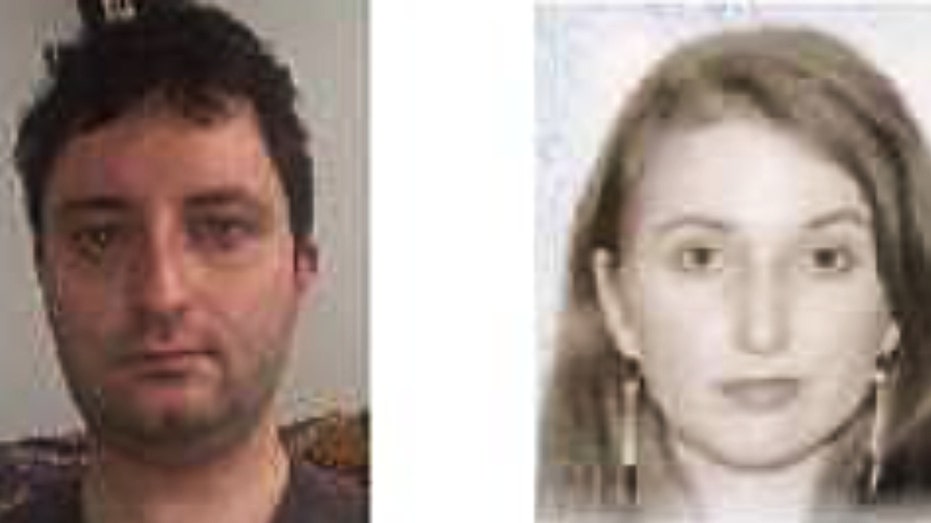Bitcoin case: Meet the couple who allegedly scammed $4.5B in crypto
The couple could face up to 25 years in prison if convicted
Bitcoin is 'very good' for America: John Warren
Gem Mining CEO John Warren and Rosecliff founder Mike Murphy give their take on the benefits of mining Bitcoin and if stock picking should be allowed for everyone on 'Making Money.'
The Justice Department this week carried out its largest cryptocurrency bust to date after seizing billions in stolen bitcoin from Ilya Lichtenstein and his wife Heather Morgan aka "Crocodile of Wall Street."

In this courtroom sketch, attorney Sam Enzer, center, sits between Heather Morgan, left, and her husband, Ilya "Dutch" Lichtenstein, in federal court, Tuesday, Feb. 8, 2022, in New York. The couple are accused of conspiring to launder billions of dol (AP Newsroom)
FOX Business takes a look at who the couple are and how they allegedly stole approximately $4.5 billion worth of bitcoin.
DOJ SEIZES $3.6B IN STOLEN BITCOIN, ARREST NYC COUPLE IN LARGEST CRYPTO BUST TO DATE
Heather Morgan aka ‘Crocodile of Wall Street’
Heather Morgan has worn many hats, including economist, writer and Salesfolk CEO. As a writer, she has contributed to publications such as Forbes and Inc. Magazine.
In one article for Forbes in 2019, Morgan advises burnt-out executives to try rapping — something she pursued after "everything started to fall apart" during a business trip to Asia in 2018.
"Within a few weeks, I had legal threats, learned that dishonest employees that were fudging numbers, and people I once deeply respected were trying to bully and shame me into removing content I had published that I firmly believed the public needed to see," she explained. "Things really sucked. And then, to make matters worse, both my parents found out they had different kinds of cancer within about a week from each other."

(Source: Razzlekhan.com)
"My life was a mess, and I also felt like an a*****e for not spending more time with family and other loved ones," she added. "That’s about when burnout hit me like a sack of bricks."
From there, Razzlekhan, the self-proclaimed "Crocodile of Wall Street" was born. According to her website, Razzlekahn is "like Genghis Khan, but with more pizzazz" and is here to "stick up for misfits and underdogs everywhere." She cites inspiration from rappers including Mickey Avalaon, Tierra Whack and South African duo Die Antwood as well as creative works of Salvador Dali, Diane Arbus, Hunter S Thompson, Roald Dahl and Charles Bukowsky. In addition to being a rapper, she also describes herself as a designer and surrealist artist.
In June 2020, Morgan wrote an article entitled "Experts Share Tips to Protect Your Business From Cybercriminals."

Ilya Lichtenstein, 34, and his wife, Heather Morgan, 31. (DOJ)
Ilya Lichtenstein
According to Lichtenstein's LinkedIn, the 34-year-old is a technology investor, entrepreneur and investor interested in blockchain technology, automation and big data. His Medium account also refers to him as an "explorer, and occasional magician."
In May 2011, Lichtenstein became the co-founder and CEO of MixRank, a platform used by sales teams to automate lead prospecting and find new customers by scanning millions of companies, websites and mobile apps. According to its website, the company received initial funding from Y Combinator in 2011 and has been supported by investors including Mark Cuban.
He went on to found Endpass in 2018, a blockchain startup that solves problems in "decentralized identity and authentication." In 2019, he and his then-girlfriend Heather Morgan got engaged. According to his Facebook page, Lichtenstein proposed through a "creative multi-channel marketing campaign."
Lichtenstein most recently served as a mentor at 500 Global, a venture capital firm with more than $2.3 billion in assets under management that invests early in founders building fast-growing technology companies, an adviser at SalesFolk, a company specializing in cold email copywriting, and an investor at Demandpath, a boutique micro-fund investing in "the next generation of promising technologies."
BITCOIN TRADES ABOVE $43,000 WEDNESDAY MORNING
Lichtenstein and Morgan's arrest
The New York City couple was arrested in Manhattan on Tuesday for an alleged conspiracy to launder cryptocurrency that was stolen during the 2016 hack of Bitfinex, a virtual currency exchange, and presently valued at approximately $4.5 billion.
The criminal complaint alleges that Lichtenstein and Morgan used different laundering techniques, including using fake identifies to set up online accounts; using computer programs to execute fast, automated transactions; depositing stolen funds in numerous crypto exchange accounts to cover transaction history; converting bitcoin to other forms of virtual currency; and using U.S.-based business accounts to make their funds seem legitimate.
GET FOX BUSINESS ON THE GO BY CLICKING HERE
According to court documents, a hacker allegedly laundered the proceeds of 119,754 bitcoin via 2,000 transactions on Bitfinex's website over the course of five years and transferred those funds into Lichtenstein's digital wallet. About 25,000 of those bitcoin were then transferred out of that wallet through a complicated laundering process and into accounts controlled by both Lichtenstein and Morgan, the documents stated. More than 94,000 bitcoin remained in Lichtenstein's wallet used to store the illegal funds, according to the criminal complaint.
Special agents executed search warrants of the couple's online accounts and accessed files containing the passwords to their digital wallet linked to the stolen Bitfinex funds, allowing agents to seize the stolen bitcoin valued at $3.6 billion at the time of the seizure. They used their bitcoin to purchase gold and gift cards for personal expenses, authorities said.
A New York judge has set bail for Morgan and Lichtenstein at $3 million and $5 million, respectively. If convicted of the charges of conspiracy to commit money laundering and conspiracy to defraud the United States, the couple could face a maximum sentencing of 25 years in prison.
A representative for Morgan and Lichtenstein did not immediately return FOX Business' request for comment.
Fox Business' Audrey Conklin and Daniella Genovese contributed to this report.





















